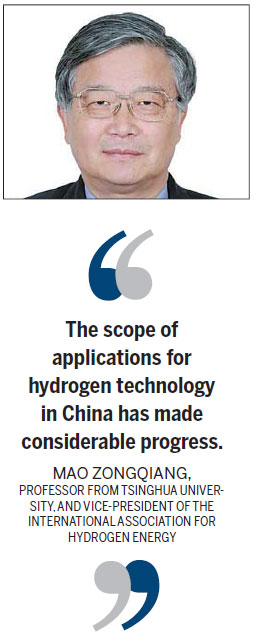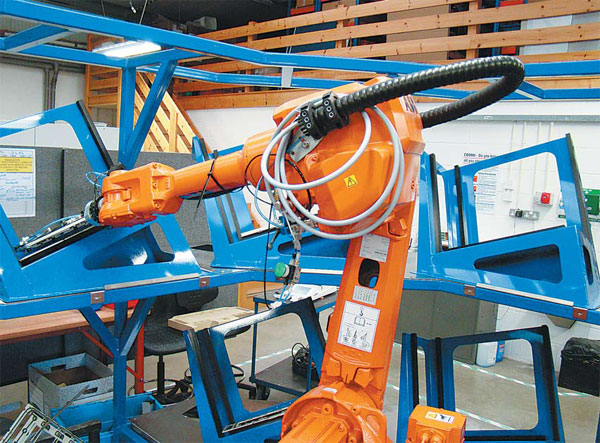Powering up fuel cells

Domestic hydrogen power experts and foreign firms hope the technology takes on a bigger role
China's development of the world's first hydrogen-powered streetcar - which rolled off a production line in March - was hailed as a big step forward in clean energy use.
The tram, built by Chinese state-owned manufacturer Qingdao Sifang Co, travels at speeds up to 69 kilometers per hour. It is powered by onboard hydrogen fuel cells.
| A robot welds parts using an electrode at AFC Energy. United Kingdom-based AFC Energy plc is one of many foreign companies interested in extending its outreach to the Chinese hydrogen market. Photos provided to China Daily |
Refueling takes three minutes, after which a three-car tram capable of carrying as many as 380 passengers can run for about 100 km, according to a Bloomberg Business report.
Hydrogen fuel cells generate electricity by creating a chemical reaction using hydrogen and oxygen. The only thing it leaves behind is water.
The tram was also cited as more evidence of the Chinese government's dedication to conserve energy and combat heavy pollution brought on by rapid development in the past three decades.
Yet, hydrogen energy experts say they are concerned that a lack of national planning for hydrogen energy development is likely to cloud the prospect of hydrogen's future in China.
They cited what they called a lack of emphasis on hydrogen in a government report about plans to further develop new and clean energy sources.
Premier Li Keqiang pledged, at this year's National People's Congress in March, to put more weight behind the development of wind power, photovoltaic power and biomass energy, emphasizing that a "revolution in energy generation and consumption is vital to any country's development and to the well-being of its people".
The government will work to further develop hydroelectric power such as power produced by dams, and stress safety in developing nuclear power, Li added.
Hydrogen fuel cells are not a new technology to China, but have been researched and developed since the 1970s, when a prototype alkaline fuel cell was developed for use in its space program, according to a report in Fuel Cell Today.

But hydrogen fuel development and application in China are currently in a marginal position, says Professor Mao Zongqiang from Tsinghua University, who is also vice-president of the International Association for Hydrogen Energy.
"Unlike countries such as the US, Japan, the UK and other European states that have a strategic road map for hydrogen energy development, China has not specified a clear national mandate. The unclear signal from the government provides no confidence for investors in China to heavily develop hydrogen energy."
Although there are a handful of Chinese companies involved in hydrogen R&D, not many are state-owned enterprises. In addition, there is a limited understanding in the general Chinese public, Mao says.
"When people talk about hydrogen in China, they tend to associate it with the explosion of hydrogen balloons or even the H-bomb. Hence, the concern over hydrogen utilization. This is caused by insufficient and inaccurate publicity on hydrogen energy development.
"As a matter of fact, the scope of applications for hydrogen technology in China has made considerable progress," Mao says, citing the hydrogen-powered streetcar made by Qingdao Sifang.
Another example is Zhengzhou Yutong Bus Co Ltd, which in 2014 joined the Technology Innovation Alliance of the China Fuel Cell Automobile Industry. The company was involved in an industrialization of fuel cell power systems project and successfully passed the first factory qualification inspection for fuel cell buses in China's bus industry.
Currently there are some downsides to the fuel. Although abundant in the universe, hydrogen is fairly rare in the atmosphere, meaning that it has to be extracted, and the process can be cost prohibitive and too inefficient for many uses, according to futurecars.com.
But hydrogen experts are confident that hydrogen will be a vital part of the clean energy used by China over the long term.
"I think there is a great significance to developing hydrogen technology to reduce pollution and improve the environment, as it can be obtained through a wide range of channels and also is easy to store on a large scale," Mao says.
"Another important element is that hydrogen fuel could be an environmentally sound solution to the transportation need of China's emerging urban middle class. Compared with an electric moped that needs to be charged for a total of 30 minutes for an 8-hour usage, a hydrogen refill is as convenient as a gasoline refill and can be completed in three minutes," says Mao.
Given the potential in the Chinese market, a number of foreign companies are keen on tapping into the Chinese hydrogen market. United Kingdom-based AFC Energy plc is one of the companies interested in extending its outreach to China.
Backed by the owner of the UK's Chelsea Football Club, Russian billionaire Roman Abramovich, AFC Energy describes itself as a developer of low-cost alkaline fuel cell technology focused on industrial applications.
Alkaline fuel cells are composed of two electrodes separated by porous material saturated with a liquid alkaline solution. They have been used in NASA space missions since the 1960s and generally are lower in cost and more advanced than other fuel cells. AFC Energy's main obstacle has been making it simple and therefore cheap enough to break into the markets it wants.
As part of the first stage of commercial deployment of AFC's systems, a contract to develop 50 megawatts of fuel cell power in South Korea was signed by the company in early March.
The company estimates its deal with Samyoung Corp and Chang Shin Chemical Co would generate revenues of as much as 670 million pounds ($1 billion; 940 million euros) over the next 10 years. AFC will own 40 percent of the venture, Samyoung 45 percent and Changshin the remainder.
AFC, in early April, has signed a tentative agreement to initiate a program of commercial fuel cell deployment with leading Thai gas company Bangkok Industrial Gas to install 10 mW of alkaline fuel cell capacity in the Rayong province of Thailand.
The initial plan is to get 2 mW operational by the end of 2016, 5 mW by 2017 and the remaining by the end of 2018.
AFC recently signed another landmark memorandum of understanding with Dubai Carbon for an estimated 300 mW of AFC Fuel Cells in Dubai.
With all the recent progress, Adam Bond, AFC Energy's CEO, says Asia offers significant opportunities in fuel cell development.
Bond says he thinks the market for fuel cells in China is enormous, but the opportunity is really about how fuel cells can deliver on the Chinese government's de-carbonization goals. "The fuel cell can complement other technologies, like the cleaner coal technology that's being deployed in China, to achieve broader government mandate objectives for the environment," Bond says.
"I think the (Chinese) government, through a number of its mandates to the industry, has asked the fuel cell to be a part of the mix. The question is how does one best deploy that, whether it is developing one's own technology in house, through the high quality of academia in Chinese universities, or being partners with Western companies," he adds.
Bond says he thinks the right partners and the right avenues to deploy the technology are critical. He says the company is looking for clear signals from the Chinese government before trying to enter China.
"If the Chinese government or a Chinese company were to show a very unambiguous statement of intent to pursue hydrogen, I would be exceedingly happy to travel to China to meet with them," he says.
According to Bond, what AFC is looking for in China is similar to what is happening in Japan. The Japanese government has clearly said it wants to invest hundreds of millions of dollars into the hydrogen economy, and have the 2020 Summer Olympics fueled by hydrogen-based energy.
"It's a very clear government mandated and supported program in hydrogen fuel cell deployment. We need to see that in a country as a market signal, and if China is prepared to go down that road, it would have companies lining up," Bond says.
Mao adds: "The Chinese government is actively promoting clean energy. As the new Five-Year Plan is set to be announced, more new signals will be coming out and foreign fuel cell companies should take the initiative to grasp the opportunities."
Ning Hui contributed to this story.
For China Daily
(China Daily European Weekly 05/01/2015 page26)
Today's Top News
- Japan tempting fate if it interferes in the situation of Taiwan Strait
- Stable trade ties benefit China, US
- Experts advocate increasing scope of BRI to include soft power sectors
- New engine powers cargo drone expansion
- China to boost green industry cooperation
- Manufacturing PMI rises in November































